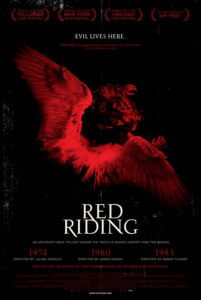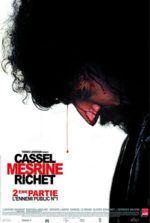
Red Riding: 1983
3.5 Stars- Director
- Anand Tucker
- Cast
- Mark Addy, Sean Bean, Jim Carter, Warren Clarke, Paddy Considine, Shaun Dooley, Gerard Kearns, Andrew Garfield, Rebecca Hall, Sean Harris, Eddie Marsan, David Morrissey, Peter Mullan, Maxine Peake, Lesley Sharp, Robert Sheehan, Laura Carter, Danny Mays
- Rated
- R
- Runtime
- 100 min.
- Release Date
- 02/05/2010

Red Riding: 1983 concludes the Red Riding trilogy by tying up loose ends and filling in the holes left over from the previous two films. Audiences that have followed the 1974 and 1980 episodes will find the majority of their questions answered and feel contented by the ending, though there’s no raucous finale packed with explosions or bravado shootouts. As with every entry in this trilogy, the last film contains enough neo-noir atmosphere, dramatic foreboding, and moral intrigue to remain engaging. But thanks to Tony Grisoni’s flashback-laden script, this last film has answers to supply the audience with some much-needed closure.
In a way, it’s almost disappointing that our questions are answered, given the structure of the first and second films. Both involved a protagonist investigating a series of crimes in Yorkshire, only to discover the crimes are linked to the crooked local police department. And in both cases, the protagonist falls prey to the unrelenting authority of the corrupt Yorkshire police, ending with a fatalistic message that “absolute power corrupts absolutely,” which leaves an unforgivably haunting set of questions with the viewer. Akin to the other films in the sense that it has its own protagonist—because the protagonists from the first two entries died—the third episode in the UK’s Channel 4 miniseries exposes a new character to corruption but ends without losing him to the conflict. What’s more, the film does some much-needed stitching to make the trilogy of films an impressive whole.
The story begins in 1983, when, in the town of Fitzwilliam, another little girl has gone missing. This forces inquiry as to whether or not the man arrested for the previous string of child murders, the mentally challenged Michael Myshkin (Daniel Mays), was wrongly imprisoned. Myshkin gets a new lawyer, John Piggot (Mark Addy), and Piggot’s personal investigation into the facts turns up some troubling evidence that his client may have been forced by the Yorkshire police to confess. The overweight and disheveled Piggot makes an affable protagonist, slightly pathetic and, having recently lost his mother, certainly sympathetic. Unlike the occasionally morally diverse protagonists that came before him, Piggot has little to apologize for, which is perhaps why his story doesn’t end in typical noir fashion.
Meanwhile, the film uses flashbacks to build on David Morrissey’s character, Detective Superintendent Maurice Jobson, from the previous films, showing his begrudging compliance with police corruption in Yorkshire. We see Jobson in the present, remembering the horrible things he’s seen and done, as well as his knowledge of the unspeakable atrocities committed by those in power. These scenes eventually build to the finale of this film, where Jobson breaks from his complacency and decides to take action. And aside from a silly subplot where Jobson becomes romantically involved with a medium hired to use her psychic abilities to “see” the victims, his character redeems himself through some believable regret and eventual action.
Anand Tucker seems an unlikely choice to direct one of the Red Riding films, given his filmography that includes titles like Shopgirl and Leap Year. Though he grasps the dark and rather depressing pitch, he seems to struggle at times with the visual presentation, overusing lens flares that send white and blue light bursts across the screen in moments where they add nothing to the visual language of the film as it relates to the story. But he captures some of the more gruesome aspects—such as several scenes involving torture—without becoming tasteless or exploitive, and yet he still gets the point across. More than putting his own signature on the last film, Tucker supports the unswervingly grim manner that defines the entire trilogy.
After this final Red Riding film, one comes to realize that the grouping of the three films as a complete project is more significant than the sum of its parts. Reflecting on the trilogy in its entirety brings a sense of appreciation that extends beyond the effect of any single entry this saga has to offer. And while the first two films punish the viewer with their downer endings and cynical attitude regarding the corruption of the world, this third film suggests an uncharacteristic yet welcome glimmer of hope. Made with care and patience, Red Riding: 1983 is an extremely satisfying conclusion to a monumental series of films that in sum will reward audiences willing to confront the otherwise harsh, unforgiving material.






 Red Riding: 1974
Red Riding: 1974  Mesrine: Public Enemy No. 1
Mesrine: Public Enemy No. 1